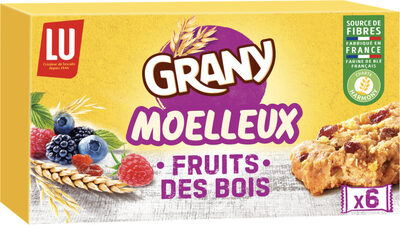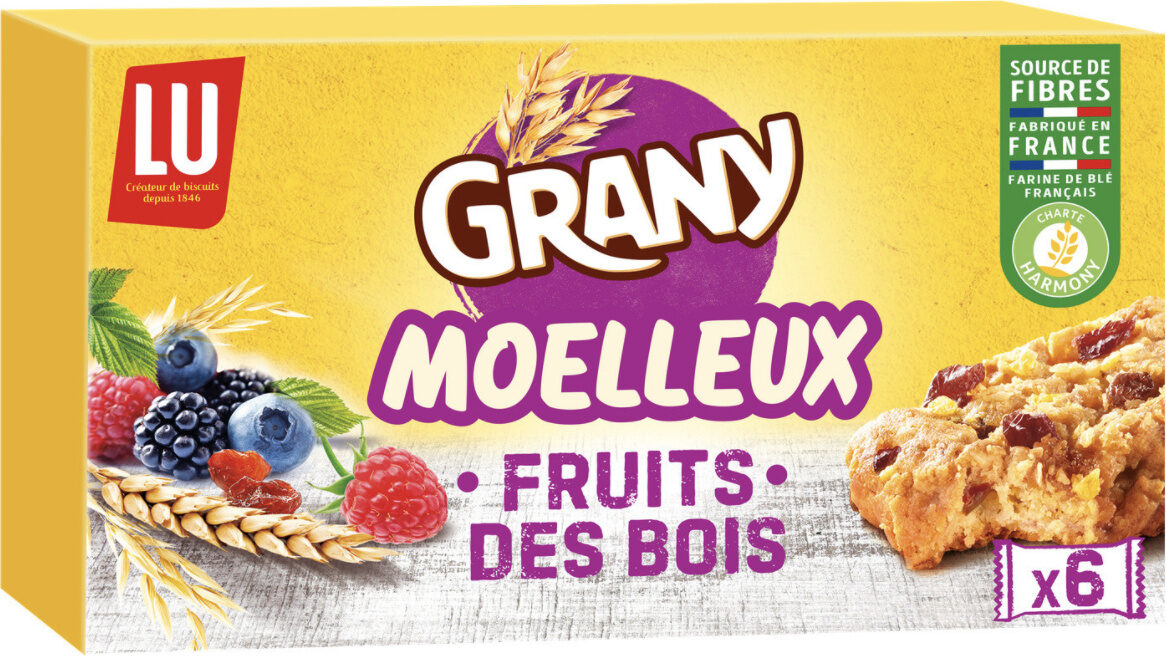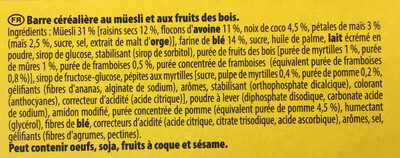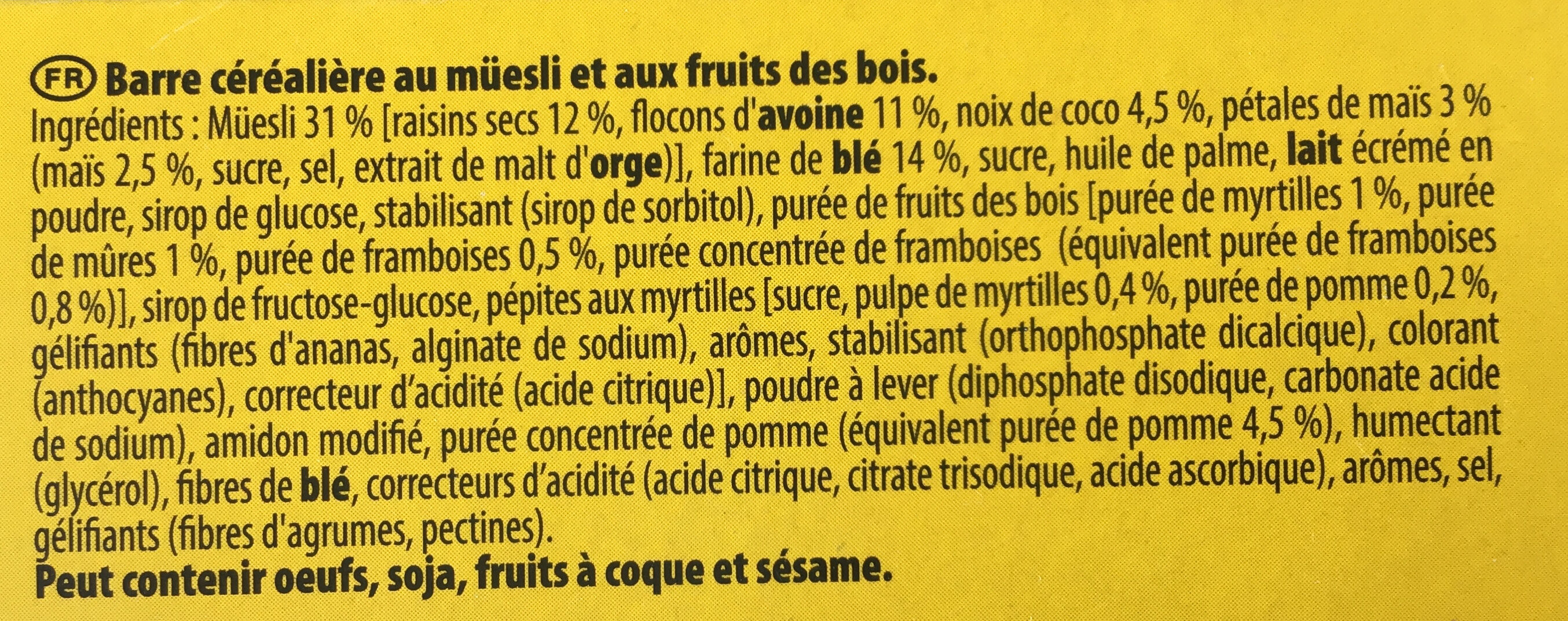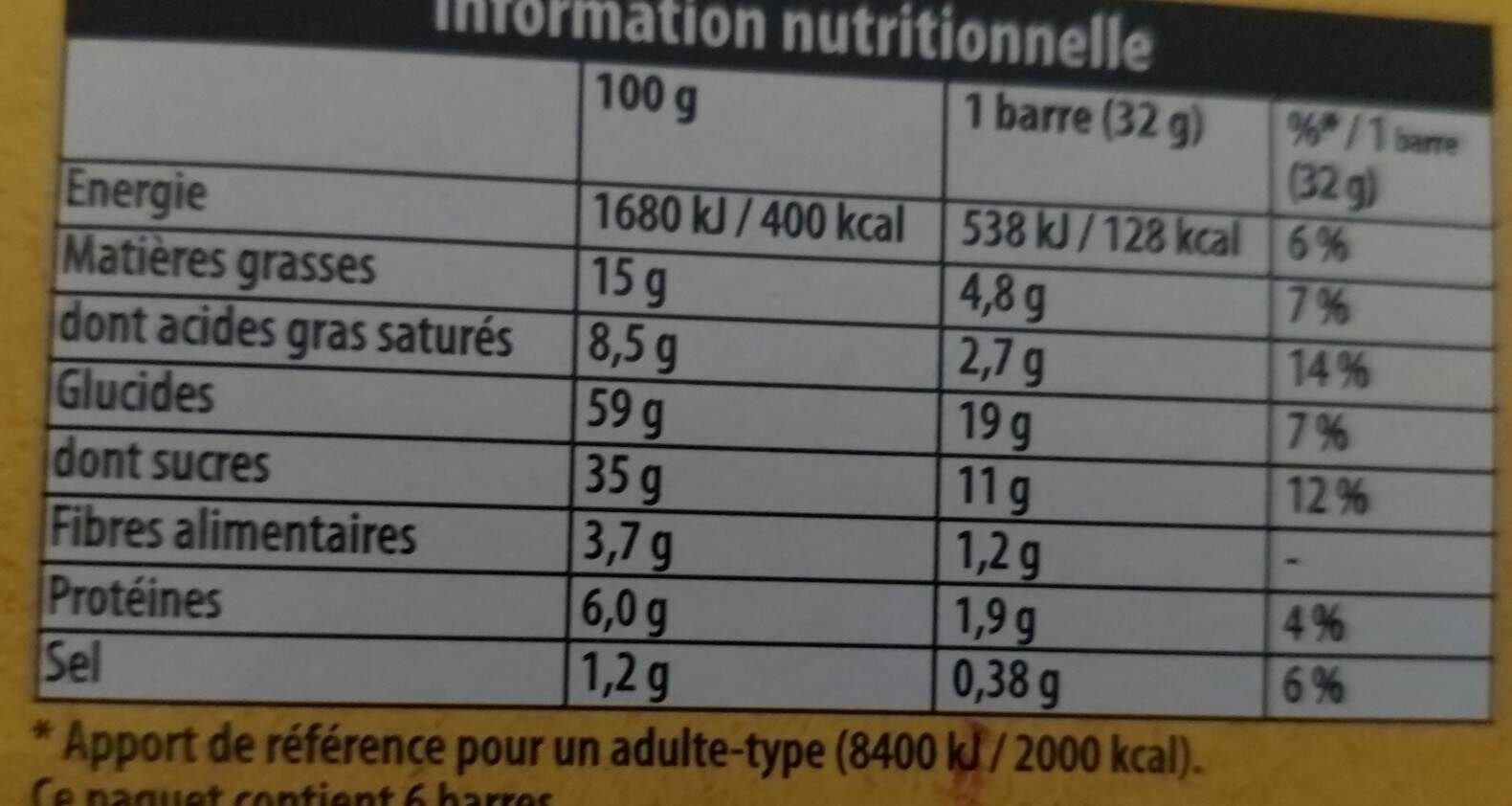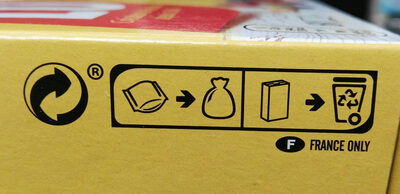Help us make food transparency the norm!
As a non-profit organization, we depend on your donations to continue informing consumers around the world about what they eat.
The food revolution starts with you!
Grany moelleux, fruit des bois - Lu - 192 g ℮, 6 biscuits en sachet individuel
Grany moelleux, fruit des bois - Lu - 192 g ℮, 6 biscuits en sachet individuel
This product page is not complete. You can help to complete it by editing it and adding more data from the photos we have, or by taking more photos using the app for Android or iPhone/iPad. Thank you!
×
Barcode: 5410041161700 (EAN / EAN-13)
Common name: Biscuit moelleux au muesli et aux fruits des bois
Quantity: 192 g ℮, 6 biscuits en sachet individuel
Packaging: fr:Boite carton, fr:Film plastique à jeter, fr:Sachet film plastique, fr:Étui carton à recycler
Categories: Snacks, Sweet snacks, Bars, Biscuits and cakes, Biscuits, Cereal bars, Fruits cereal bars
Labels, certifications, awards:
Green Dot, Made in France, fr:Blé français
Stores: Super U, Magasins U, carrefour.fr, Auchan, E.leclerc
Matching with your preferences
Health
Ingredients
-
53 ingredients
: Müesli 31 % [raisins secs 12 %, flocons d'avoine 11 %, noix de coco 4,5 %, pétales de maïs 3 % (maïs 2,5 %, sucre, sel, extrait de malt d'orge)], farine de blé 14 %, sucre, huile de palme, lait écrémé en poudre, sirop de glucose, stabilisant (sirop de sorbitol), purée de fruits des bois [purée de myrtilles 1 %, purée de mûres 1 %, purée de framboises 0,5 %, purée concentrée de framboises (équivalent purée de framboises 0,8 %)], sirop de fructose-glucose, pépites aux myrtilles [sucre, pulpe de myrtilles 0,4 %, purée de pomme 0,2 %, gélifiants (fibres d'ananas, alginate de sodium), arômes, stabilisant (orthophosphate dicalcique), colorant (anthocyanes), correcteur d'acidité (acide citrique)], poudre à lever (diphosphate disodique, carbonate acide de sodium), amidon modifié, purée concentrée de pomme (équivalent purée de pomme 4,5 %), humectant (glycérol), fibres de blé, correcteurs d'acidité (acide citrique, citrate trisodique, acide ascorbique), arômes, sel, gélifiants (fibres d'agrumes, pectines).Allergens: Gluten, MilkTraces: Eggs, Nuts, Sesame seeds, Soybeans
Food processing
-
Ultra processed foods
Elements that indicate the product is in the 4 - Ultra processed food and drink products group:
- Additive: E14XX - Modified Starch
- Additive: E163 - Anthocyanins
- Additive: E401 - Sodium alginate
- Additive: E420 - Sorbitol
- Additive: E422 - Glycerol
- Additive: E440 - Pectins
- Additive: E450 - Diphosphates
- Ingredient: Colour
- Ingredient: Flavouring
- Ingredient: Gelling agent
- Ingredient: Glucose
- Ingredient: Glucose syrup
- Ingredient: Humectant
Food products are classified into 4 groups according to their degree of processing:
- Unprocessed or minimally processed foods
- Processed culinary ingredients
- Processed foods
- Ultra processed foods
The determination of the group is based on the category of the product and on the ingredients it contains.
Additives
-
E163 - Anthocyanins
Anthocyanin: Anthocyanins -also anthocyans; from Greek: ἄνθος -anthos- "flower" and κυάνεος/κυανοῦς kyaneos/kyanous "dark blue"- are water-soluble vacuolar pigments that, depending on their pH, may appear red, purple, or blue. Food plants rich in anthocyanins include the blueberry, raspberry, black rice, and black soybean, among many others that are red, blue, purple, or black. Some of the colors of autumn leaves are derived from anthocyanins.Anthocyanins belong to a parent class of molecules called flavonoids synthesized via the phenylpropanoid pathway. They occur in all tissues of higher plants, including leaves, stems, roots, flowers, and fruits. Anthocyanins are derived from anthocyanidins by adding sugars. They are odorless and moderately astringent. Although approved to color foods and beverages in the European Union, anthocyanins are not approved for use as a food additive because they have not been verified as safe when used as food or supplement ingredients. There is no conclusive evidence anthocyanins have any effect on human biology or diseases.Source: Wikipedia
-
E330 - Citric acid
Citric acid is a natural organic acid found in citrus fruits such as lemons, oranges, and limes.
It is widely used in the food industry as a flavor enhancer, acidulant, and preservative due to its tart and refreshing taste.
Citric acid is safe for consumption when used in moderation and is considered a generally recognized as safe (GRAS) food additive by regulatory agencies worldwide.
-
E331 - Sodium citrates
Sodium citrate: Sodium citrate may refer to any of the sodium salts of citrate -though most commonly the third-: Monosodium citrate Disodium citrate Trisodium citrateThe three forms of the salt are collectively known by the E number E331. Sodium citrates are used as acidity regulators in food and drinks, and also as emulsifiers for oils. They enable cheeses to melt without becoming greasy.Source: Wikipedia
-
E331iii - Trisodium citrate
Sodium citrate: Sodium citrate may refer to any of the sodium salts of citrate -though most commonly the third-: Monosodium citrate Disodium citrate Trisodium citrateThe three forms of the salt are collectively known by the E number E331. Sodium citrates are used as acidity regulators in food and drinks, and also as emulsifiers for oils. They enable cheeses to melt without becoming greasy.Source: Wikipedia
-
E420 - Sorbitol
Sorbitol: Sorbitol --, less commonly known as glucitol --, is a sugar alcohol with a sweet taste which the human body metabolizes slowly. It can be obtained by reduction of glucose, which changes the aldehyde group to a hydroxyl group. Most sorbitol is made from corn syrup, but it is also found in nature, for example in apples, pears, peaches, and prunes. It is converted to fructose by sorbitol-6-phosphate 2-dehydrogenase. Sorbitol is an isomer of mannitol, another sugar alcohol; the two differ only in the orientation of the hydroxyl group on carbon 2. While similar, the two sugar alcohols have very different sources in nature, melting points, and uses.Source: Wikipedia
-
E420ii - Sorbitol syrup
Sorbitol: Sorbitol --, less commonly known as glucitol --, is a sugar alcohol with a sweet taste which the human body metabolizes slowly. It can be obtained by reduction of glucose, which changes the aldehyde group to a hydroxyl group. Most sorbitol is made from corn syrup, but it is also found in nature, for example in apples, pears, peaches, and prunes. It is converted to fructose by sorbitol-6-phosphate 2-dehydrogenase. Sorbitol is an isomer of mannitol, another sugar alcohol; the two differ only in the orientation of the hydroxyl group on carbon 2. While similar, the two sugar alcohols have very different sources in nature, melting points, and uses.Source: Wikipedia
-
E422 - Glycerol
Glycerol: Glycerol -; also called glycerine or glycerin; see spelling differences- is a simple polyol compound. It is a colorless, odorless, viscous liquid that is sweet-tasting and non-toxic. The glycerol backbone is found in all lipids known as triglycerides. It is widely used in the food industry as a sweetener and humectant and in pharmaceutical formulations. Glycerol has three hydroxyl groups that are responsible for its solubility in water and its hygroscopic nature.Source: Wikipedia
-
E440 - Pectins
Pectins (E440) are natural carbohydrates, predominantly found in fruits, that act as gelling agents in the food industry, creating the desirable jelly-like texture in jams, jellies, and marmalades.
Pectins stabilize and thicken various food products, such as desserts, confectioneries, and beverages, ensuring a uniform consistency and quality.
Recognized as safe by various health authorities, pectins have been widely used without notable adverse effects when consumed in typical dietary amounts.
-
E450 - Diphosphates
Diphosphates (E450) are food additives often utilized to modify the texture of products, acting as leavening agents in baking and preventing the coagulation of canned food.
These salts can stabilize whipped cream and are also found in powdered products to maintain their flow properties. They are commonly present in baked goods, processed meats, and soft drinks.
Derived from phosphoric acid, they're part of our daily phosphate intake, which often surpasses recommended levels due to the prevalence of phosphates in processed foods and drinks.
Excessive phosphate consumption is linked to health issues, such as impaired kidney function and weakened bone health. Though diphosphates are generally regarded as safe when consumed within established acceptable daily intakes, it's imperative to monitor overall phosphate consumption to maintain optimal health.
-
E500 - Sodium carbonates
Sodium carbonates (E500) are compounds commonly used in food preparation as leavening agents, helping baked goods rise by releasing carbon dioxide when they interact with acids.
Often found in baking soda, they regulate the pH of food, preventing it from becoming too acidic or too alkaline. In the culinary world, sodium carbonates can also enhance the texture and structure of foods, such as noodles, by modifying the gluten network.
Generally recognized as safe, sodium carbonates are non-toxic when consumed in typical amounts found in food.
-
E500ii - Sodium hydrogen carbonate
Sodium hydrogen carbonate, also known as E500ii, is a food additive commonly used as a leavening agent.
When added to recipes, it releases carbon dioxide gas upon exposure to heat or acids, causing dough to rise and resulting in a light, fluffy texture in baked goods.
It is generally recognized as safe (GRAS) by regulatory authorities when used in appropriate quantities and poses no significant health risks when consumed in typical food applications.
Ingredients analysis
-
Palm oil
Ingredients that contain palm oil: Palm oil
-
Non-vegan
Non-vegan ingredients: Skimmed milk powderSome ingredients could not be recognized.
We need your help!
You can help us recognize more ingredients and better analyze the list of ingredients for this product and others:
- Edit this product page to correct spelling mistakes in the ingredients list, and/or to remove ingredients in other languages and sentences that are not related to the ingredients.
- Add new entries, synonyms or translations to our multilingual lists of ingredients, ingredient processing methods, and labels.
If you would like to help, join the #ingredients channel on our Slack discussion space and/or learn about ingredients analysis on our wiki. Thank you!
-
Vegetarian status unknown
Unrecognized ingredients: Müesli, fr:pepites-aux-myrtilles, Sodium citrateSome ingredients could not be recognized.
We need your help!
You can help us recognize more ingredients and better analyze the list of ingredients for this product and others:
- Edit this product page to correct spelling mistakes in the ingredients list, and/or to remove ingredients in other languages and sentences that are not related to the ingredients.
- Add new entries, synonyms or translations to our multilingual lists of ingredients, ingredient processing methods, and labels.
If you would like to help, join the #ingredients channel on our Slack discussion space and/or learn about ingredients analysis on our wiki. Thank you!
-
Details of the analysis of the ingredients
We need your help!
Some ingredients could not be recognized.
We need your help!
You can help us recognize more ingredients and better analyze the list of ingredients for this product and others:
- Edit this product page to correct spelling mistakes in the ingredients list, and/or to remove ingredients in other languages and sentences that are not related to the ingredients.
- Add new entries, synonyms or translations to our multilingual lists of ingredients, ingredient processing methods, and labels.
If you would like to help, join the #ingredients channel on our Slack discussion space and/or learn about ingredients analysis on our wiki. Thank you!
: Müesli 31% (raisins secs 12.1967213114754%, flocons d'avoine 11.1803278688525%, noix de coco 4.57377049180328%, pétales de maïs 3.04918032786885% (maïs 2.5%, sucre, sel, extrait de malt d'orge)), farine de blé 14%, sucre, huile de palme, lait écrémé en poudre, sirop de glucose, stabilisant (sirop de sorbitol), fruits des bois (myrtilles 1%, mûres 1%, purée de framboises 0.5%, de framboises ()), sirop de fructose-glucose, pépites aux myrtilles (sucre, myrtilles 0.4%, purée de pomme 0.2%, gélifiants (fibres d'ananas, alginate de sodium), arômes, stabilisant (orthophosphate dicalcique), colorant (anthocyanes), correcteur d'acidité (acide citrique)), poudre à lever (diphosphate disodique, carbonate acide de sodium), amidon modifié, de pomme (), humectant (glycérol), fibres de blé, correcteurs d'acidité (acide citrique, citrate trisodique, acide ascorbique), arômes, sel, gélifiants (fibres d'agrumes, pectines)- Müesli -> en:muesli - percent_min: 31 - percent: 31 - percent_max: 31
- raisins secs -> en:raisin - vegan: yes - vegetarian: yes - ciqual_food_code: 13046 - percent_min: 12.1967213114754 - percent: 12.1967213114754 - percent_max: 12.1967213114754
- flocons d'avoine -> en:oat-flakes - vegan: yes - vegetarian: yes - ciqual_food_code: 9311 - percent_min: 11.1803278688525 - percent: 11.1803278688525 - percent_max: 11.1803278688525
- noix de coco -> en:coconut - vegan: yes - vegetarian: yes - ciqual_proxy_food_code: 15006 - percent_min: 4.57377049180328 - percent: 4.57377049180328 - percent_max: 4.57377049180328
- pétales de maïs -> en:corn-flakes - vegan: yes - vegetarian: yes - ciqual_food_code: 9200 - percent_min: 3.04918032786885 - percent: 3.04918032786885 - percent_max: 3.04918032786885
- maïs -> en:corn - vegan: yes - vegetarian: yes - ciqual_food_code: 9200 - percent_min: 2.5 - percent: 2.5 - percent_max: 2.5
- sucre -> en:sugar - vegan: yes - vegetarian: yes - ciqual_proxy_food_code: 31016 - percent_min: 0.183060109289617 - percent_max: 0.549180327868852
- sel -> en:salt - vegan: yes - vegetarian: yes - ciqual_food_code: 11058 - percent_min: 0 - percent_max: 0.366120218579235
- extrait de malt d'orge -> en:barley-malt-extract - vegan: yes - vegetarian: yes - percent_min: 0 - percent_max: 0.183060109289617
- farine de blé -> en:wheat-flour - vegan: yes - vegetarian: yes - ciqual_proxy_food_code: 9410 - percent_min: 14 - percent: 14 - percent_max: 14
- sucre -> en:sugar - vegan: yes - vegetarian: yes - ciqual_proxy_food_code: 31016 - percent_min: 3.23529411764706 - percent_max: 14
- huile de palme -> en:palm-oil - vegan: yes - vegetarian: yes - from_palm_oil: yes - ciqual_food_code: 16129 - percent_min: 2.5625 - percent_max: 14
- lait écrémé en poudre -> en:skimmed-milk-powder - vegan: no - vegetarian: yes - ciqual_food_code: 19054 - percent_min: 2.5 - percent_max: 14
- sirop de glucose -> en:glucose-syrup - vegan: yes - vegetarian: yes - ciqual_proxy_food_code: 31016 - percent_min: 2.5 - percent_max: 12.484375
- stabilisant -> en:stabiliser - percent_min: 2.5 - percent_max: 9.4875
- sirop de sorbitol -> en:e420ii - vegan: yes - vegetarian: yes - percent_min: 2.5 - percent_max: 9.4875
- fruits des bois -> en:forest-berries - vegan: yes - vegetarian: yes - percent_min: 2.5 - percent_max: 2.5
- myrtilles -> en:blueberry - vegan: yes - vegetarian: yes - ciqual_food_code: 13028 - percent_min: 1 - percent: 1 - percent_max: 1
- mûres -> en:blackberry - vegan: yes - vegetarian: yes - ciqual_food_code: 13029 - percent_min: 1 - percent: 1 - percent_max: 1
- purée de framboises -> en:raspberry-puree - vegan: maybe - vegetarian: maybe - ciqual_food_code: 13015 - percent_min: 0.5 - percent: 0.5 - percent_max: 0.5
- de framboises -> en:raspberry - vegan: yes - vegetarian: yes - ciqual_food_code: 13015 - percent_min: 0 - percent_max: 0
- sirop de fructose-glucose -> en:glucose-fructose-syrup - vegan: yes - vegetarian: yes - ciqual_food_code: 31077 - percent_min: 1 - percent_max: 2.5
- pépites aux myrtilles -> fr:pepites-aux-myrtilles - percent_min: 1 - percent_max: 2.5
- sucre -> en:sugar - vegan: yes - vegetarian: yes - ciqual_proxy_food_code: 31016 - percent_min: 0.4 - percent_max: 1.9
- myrtilles -> en:blueberry - vegan: yes - vegetarian: yes - ciqual_food_code: 13028 - percent_min: 0.4 - percent: 0.4 - percent_max: 0.4
- purée de pomme -> en:apple-puree - vegan: maybe - vegetarian: maybe - ciqual_food_code: 13050 - percent_min: 0.2 - percent: 0.2 - percent_max: 0.2
- gélifiants -> en:gelling-agent - percent_min: 0 - percent_max: 0.2
- fibres d'ananas -> en:pineapple-fibre - vegan: yes - vegetarian: yes - percent_min: 0 - percent_max: 0.2
- alginate de sodium -> en:e401 - vegan: yes - vegetarian: yes - percent_min: 0 - percent_max: 0.2
- arômes -> en:flavouring - vegan: maybe - vegetarian: maybe - percent_min: 0 - percent_max: 0.2
- stabilisant -> en:stabiliser - percent_min: 0 - percent_max: 0.2
- orthophosphate dicalcique -> en:e341 - vegan: yes - vegetarian: yes - percent_min: 0 - percent_max: 0.2
- colorant -> en:colour - percent_min: 0 - percent_max: 0.2
- anthocyanes -> en:e163 - vegan: yes - vegetarian: yes - percent_min: 0 - percent_max: 0.2
- correcteur d'acidité -> en:acidity-regulator - percent_min: 0 - percent_max: 0.2
- acide citrique -> en:e330 - vegan: yes - vegetarian: yes - percent_min: 0 - percent_max: 0.2
- poudre à lever -> en:raising-agent - percent_min: 0 - percent_max: 2.5
- diphosphate disodique -> en:e450i - vegan: yes - vegetarian: yes - percent_min: 0 - percent_max: 2.5
- carbonate acide de sodium -> en:e500ii - vegan: yes - vegetarian: yes - percent_min: 0 - percent_max: 1.25
- amidon modifié -> en:modified-starch - vegan: yes - vegetarian: yes - ciqual_proxy_food_code: 9510 - percent_min: 0 - percent_max: 2.5
- de pomme -> en:apple - vegan: yes - vegetarian: yes - ciqual_food_code: 13050 - percent_min: 0 - percent_max: 0
- humectant -> en:humectant - percent_min: 0 - percent_max: 0
- glycérol -> en:e422 - vegan: maybe - vegetarian: maybe - percent_min: 0 - percent_max: 0
- fibres de blé -> en:wheat-fiber - vegan: yes - vegetarian: yes - percent_min: 0 - percent_max: 0
- correcteurs d'acidité -> en:acidity-regulator - percent_min: 0 - percent_max: 0
- acide citrique -> en:e330 - vegan: yes - vegetarian: yes - percent_min: 0 - percent_max: 0
- citrate trisodique -> en:sodium-citrate - percent_min: 0 - percent_max: 0
- acide ascorbique -> en:e300 - vegan: yes - vegetarian: yes - percent_min: 0 - percent_max: 0
- arômes -> en:flavouring - vegan: maybe - vegetarian: maybe - percent_min: 0 - percent_max: 0
- sel -> en:salt - vegan: yes - vegetarian: yes - ciqual_food_code: 11058 - percent_min: 0 - percent_max: 0
- gélifiants -> en:gelling-agent - percent_min: 0 - percent_max: 0
- fibres d'agrumes -> en:citrus-fibre - vegan: yes - vegetarian: yes - percent_min: 0 - percent_max: 0
- pectines -> en:e440a - vegan: yes - vegetarian: yes - percent_min: 0 - percent_max: 0
en:wheat -> en:wheat
Nutrition
-
Bad nutritional quality
⚠ ️Warning: the amount of fruits, vegetables and nuts is not specified on the label, it was estimated from the list of ingredients: 19This product is not considered a beverage for the calculation of the Nutri-Score.
Positive points: 3
- Proteins: 3 / 5 (value: 6, rounded value: 6)
- Fiber: 3 / 5 (value: 3.7, rounded value: 3.7)
- Fruits, vegetables, nuts, and colza/walnut/olive oils: 0 / 5 (value: 19.8704918032787, rounded value: 19.9)
Negative points: 25
- Energy: 5 / 10 (value: 1680, rounded value: 1680)
- Sugars: 7 / 10 (value: 35, rounded value: 35)
- Saturated fat: 8 / 10 (value: 8.5, rounded value: 8.5)
- Sodium: 5 / 10 (value: 480, rounded value: 480)
The points for proteins are not counted because the negative points are greater or equal to 11.
Nutritional score: (25 - 3)
Nutri-Score:
-
Nutrient levels
-
Fat in moderate quantity (15%)
What you need to know- A high consumption of fat, especially saturated fats, can raise cholesterol, which increases the risk of heart diseases.
Recommendation: Limit the consumption of fat and saturated fat- Choose products with lower fat and saturated fat content.
-
Saturated fat in high quantity (8.5%)
What you need to know- A high consumption of fat, especially saturated fats, can raise cholesterol, which increases the risk of heart diseases.
Recommendation: Limit the consumption of fat and saturated fat- Choose products with lower fat and saturated fat content.
-
Sugars in high quantity (35%)
What you need to know- A high consumption of sugar can cause weight gain and tooth decay. It also augments the risk of type 2 diabetes and cardio-vascular diseases.
Recommendation: Limit the consumption of sugar and sugary drinks- Sugary drinks (such as sodas, fruit beverages, and fruit juices and nectars) should be limited as much as possible (no more than 1 glass a day).
- Choose products with lower sugar content and reduce the consumption of products with added sugars.
-
Salt in moderate quantity (1.2%)
What you need to know- A high consumption of salt (or sodium) can cause raised blood pressure, which can increase the risk of heart disease and stroke.
- Many people who have high blood pressure do not know it, as there are often no symptoms.
- Most people consume too much salt (on average 9 to 12 grams per day), around twice the recommended maximum level of intake.
Recommendation: Limit the consumption of salt and salted food- Reduce the quantity of salt used when cooking, and don't salt again at the table.
- Limit the consumption of salty snacks and choose products with lower salt content.
-
-
Nutrition facts
Nutrition facts As sold
for 100 g / 100 mlCompared to: Fruits cereal bars Energy 1,680 kj
(400 kcal)+3% Fat 15 g +42% Saturated fat 8.5 g +182% Carbohydrates 59 g -6% Sugars 35 g +19% Fiber 3.7 g -41% Proteins 6 g -6% Salt 1.2 g +323% Fruits‚ vegetables‚ nuts and rapeseed‚ walnut and olive oils (estimate from ingredients list analysis) 19.87 %
Environment
-
Eco-Score C - Moderate environmental impact
⚠ ️Select a country in order to include the full impact of transportation.The Eco-Score is an experimental score that summarizes the environmental impacts of food products.→ The Eco-Score was initially developped for France and it is being extended to other European countries. The Eco-Score formula is subject to change as it is regularly improved to make it more precise and better suited to each country.Life cycle analysis
-
Average impact of products of the same category: B (Score: 73/100)
Category: Cereal bar w fruit
Category: Cereal bar w fruit
- PEF environmental score: 0.32 (the lower the score, the lower the impact)
- including impact on climate change: 2.46 kg CO2 eq/kg of product
Stage Impact Agriculture
74.4 %Processing
12.6 %Packaging
7.3 %Transportation
4.2 %Distribution
1.5 %Consumption
0.0 %
Bonuses and maluses
-
Origins of ingredients with a high impact
Malus: -4
Environmental policy: -4
Transportation: 0
Origin of the product and/or its ingredients % of ingredients Impact Unknown 86 %High France 14 %Medium
-
Ingredients that threatens species
Malus: -10
Contains palm oil
Tropical forests in Asia, Africa and Latin America are destroyed to create and expand oil palm tree plantations. The deforestation contributes to climate change, and it endangers species such as the orangutan, the pigmy elephant and the Sumatran rhino.
-
Packaging with a medium impact
Malus: -13
Shape Material Recycling Impact Film Plastic Discard High Sleeve Cardboard Recycle Low Bag Plastic High Box Cardboard Low
Eco-Score for this product
-
Impact for this product: C (Score: 46/100)
Product: Grany moelleux, fruit des bois - Lu - 192 g ℮, 6 biscuits en sachet individuel
Life cycle analysis score: 73
Sum of bonuses and maluses: -27
Final score: 46/100
-
Carbon footprint
-
Equal to driving 1.3 km in a petrol car
246 g CO² per 100g of product
The carbon emission figure comes from ADEME's Agribalyse database, for the category: Cereal bar w fruit (Source: ADEME Agribalyse Database)
Stage Impact Agriculture
71.5 %Processing
9.6 %Packaging
11.5 %Transportation
6.7 %Distribution
0.8 %Consumption
0.0 %
Packaging
-
Packaging with a medium impact
-
Packaging parts
Sleeve (Cardboard)
Film (Plastic)
Bag (Plastic)
Box (Cardboard)
-
Packaging materials
Material % Packaging weight Packaging weight per 100 g of product Paper or cardboard Plastic Total
-
Transportation
-
Origins of ingredients
Origins of ingredients with a high impact
Origin of the product and/or its ingredients % of ingredients Impact Unknown 86 %High France 14 %Medium
Threatened species
-
Contains palm oil
Drives deforestation and threatens species such as the orangutan
Tropical forests in Asia, Africa and Latin America are destroyed to create and expand oil palm tree plantations. The deforestation contributes to climate change, and it endangers species such as the orangutan, the pigmy elephant and the Sumatran rhino.
Report a problem
-
Incomplete or incorrect information?
Category, labels, ingredients, allergens, nutritional information, photos etc.
If the information does not match the information on the packaging, please complete or correct it. Open Food Facts is a collaborative database, and every contribution is useful for all.
Data sources
Product added on by openfoodfacts-contributors
Last edit of product page on by dorado-jerome.
Product page also edited by agiraud, aleene, asmoth, beniben, cestki13, countrybot, cpierre, date-limite-app, desan, driveoff, ecoscore-impact-estimator, foodviewer, jkapralikova, kiliweb, magasins-u, packbot, tacite, yuka.SHBzWkhJdGNsOFVVcThkZ29CZU0xc2hsNktLMEFudTNNTHBLSUE9PQ, yuka.U3B4ZkRhWXEvUDB5bXZZdzhSYnRwYzFMNUkyRVVtZXpBc29lSWc9PQ, yuka.sY2b0xO6T85zoF3NwEKvlkVmfYPwrBTgDibmuG_Q1-3fPszCTY5cxdnLEqo, yuka.sY2b0xO6T85zoF3NwEKvlkx1Y-DkmhfGE0znvlSVwvaONp_qX_tW3pXZbas, yuka.sY2b0xO6T85zoF3NwEKvlnFqVovnvAvYMD7WulKq5_utHLvXZsMp-q_aA6s.
Last check of product page on by aleene.
